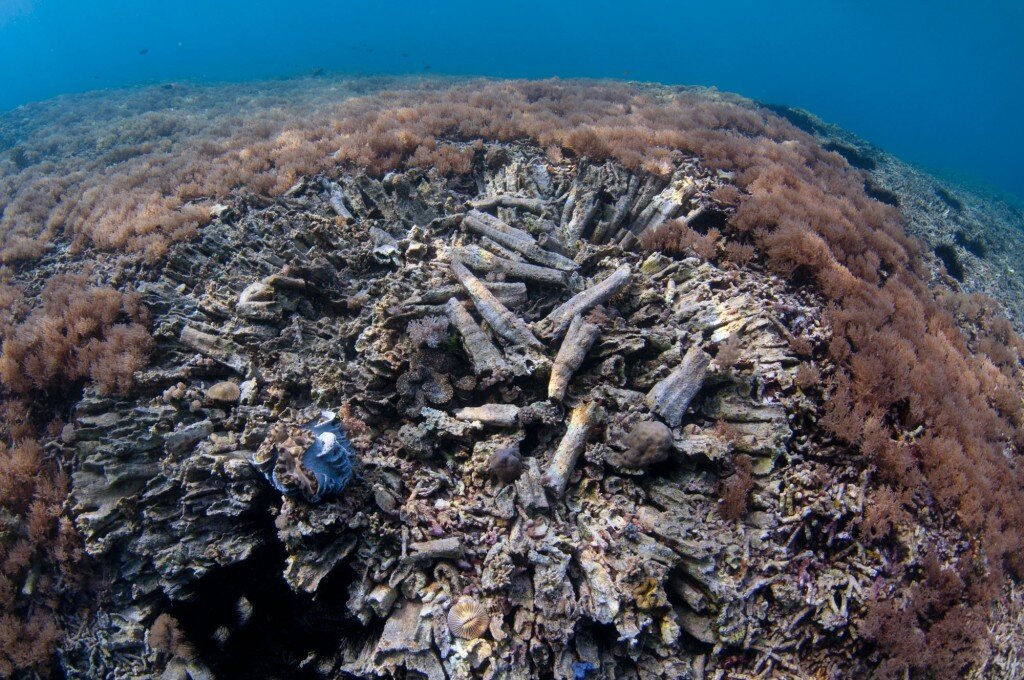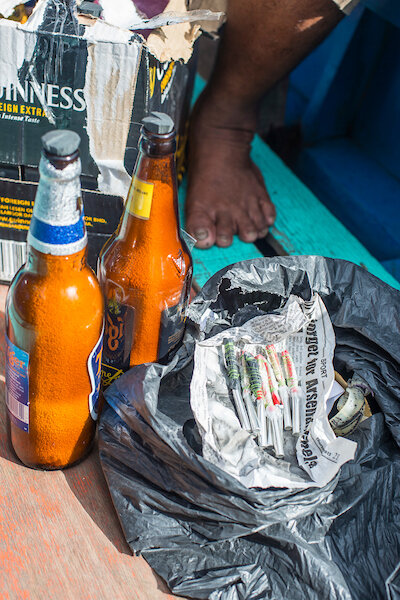
Fish Bombing FAQs
Where Is Fish Bombing (AKA Dynamite Fishing Or Blast Fishing) Happening?
Fish bombing occurs in many tropical coral reef areas around the world. It is a severe problem and widespread in South East Asia, as well as east Africa and Central America.
SFB is currently focused on Sabah, Malaysia with testing and monitoring in Sipadan Island Park, Tunku Abdul Rahman Park, and Tun Sakaran Marine Park.
This map below shows one of the most concentrated regions of damage located in the Coral Triangle area of South East Asia. Note that the northern portion of Borneo is in a severely impacted area, and that is where SoundThinking™ and the Stop Fish Bombing group have done our testing. The area is peppered with small villages that have been threatened by the illegal bombers. In some cases, they are used as local labor to gather bombed fish, in others the bombers simply take over a village, plundering whatever they want.
Why Is Fish Bombing So Destructive?
When fishermen use bombs to catch fish thy not only kill the fish they are trying to harvest but the kill other species of aquatic wildlife, younger generations of fish, and can reduce slow-growing corals to rubble.
What Bombs Do Blast Fishermen Use?
It depends on the region. Some fishermen use grenades or other live ordnance from previous conflicts, while others make their own explosives from readily available fertilizer and other simple ingredients.
Photos courtesy of Scubazoo Images.
Isn’t Fish Bombing Dangerous For The Fishermen?
Yes it is very dangerous. Many blast fishermen have suffered horrific injuries, or even killed themselves in accidents with explosives, sadly impoverishing their families further.
Why Do Fishermen Use Bombs If It Is Dangerous?
In areas with pristine coral reefs and abundant fish life, a single bomb quickly yields more fish to feed many families. The blast fishermen have no nets to untangle, and don’t have to wait a long time for fish to take bait from a line.
So What Do The Fishermen Do When Their Local Reef Is Destroyed?
They travel further in their small fishing boats in search of areas with healthier coral, and more fish life. Obviously, when these areas are also destroyed the fishermen again have to travel even further, costing more time and money – their returns diminish and they face poverty.
The Fish Are Going To Be Caught And Eaten Anyway, So Why Not Use Bombs To Kill Them?
Fish bombing is a very wasteful, destructive, and unsustainable fishing method. Typically, more than half of the fish killed from one bomb are not collected by the fishermen. Blasts also indiscriminately kill young fish that haven’t reached sexual maturity, as well as many other species of marine animals that are not usually caught, such as turtles. Worse still, blasts on the seabed also destroy the coral reef itself, reducing the pristine, slow-growing hard corals to lifeless rubble. Coral reefs are a vital habitat and food source on which infinite fish and marine life depend, and without them the consequences would be dire.
Is fish bombing illegal?
Yes, fish bombing is illegal in many countries around the world, however laws regarding this fishing practice are often not fully implemented, and difficult to enforce in remote areas. The sound from fish bombs is trapped underwater, making it very difficult to detect from the surface. If a fishermen is about to caught they can quickly discard any evidence of fish bombing overboard, and therefore convictions are very rare. The risk of fines or imprisonment is so low that the blast fishermen are more than willing to continue.
How Can We Stop Fish Bombing?
We have proven technologies that can pinpoint fish bombs as they happen and provide solid evidence for convictions. Working together with governments and law enforcement, we can greatly improve operational efficiency of enforcement activities and legal processes.
You can help by donating to SFB USA or by liking our Facebook page.
With Various Other Problems In Countries Where Fish Bombing Is Practiced, Aren’t There Higher Priorities We Should Be Concerned About?
The coral reefs of South East Asia currently provide food for well over half a billion people, provide natural coastal protection, and attract millions of tourists each year. Recent estimates place the value of goods and services provided by coral reefs worldwide between $172 – 375 billion annually. Unfortunately, few people are aware of this and the destruction from fish bombing and other destructive fishing techniques continues unabated. We believe our action regarding fish bombing is highly relevant for protecting the long-term future of hundreds of millions of people.
Ref: The Coral Reef Crisis: The Critical Importance of <350 PPM CO2 by Veron, J. E. N, O. Hoegh-Guldberg, T. M. Lenton, J. M. Lough, D. O. Obura, P. Pearce-Kelly, C. R, C Sheppards, M. Spalding, M. G. Stafford-Smith, and A. D. Rogers.
Photos courtesy of Scubazoo Images.









